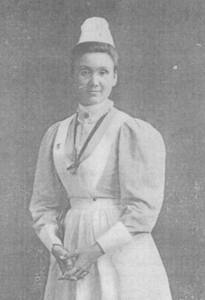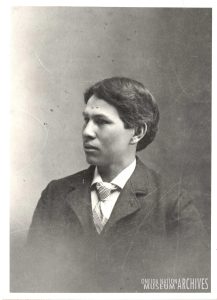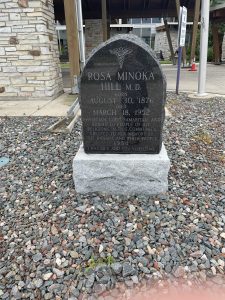Additional Information
Why Choose Us
Our mission at Oneida Comprehensive Health Division is to provide the highest quality, holistic health care to improve the health and wellness of OUR Oneida Community. Our collective values include responsive leadership, cultural sensitivity, respect, continuous improvement, communication, safety and trust.
Our providers and staff participate in ongoing learning about our cultural heritage in order to provide care in a culturally sensitive manner. Our work honors the Oneida women who first had the dream and vision to provide health care for tribal members. And our facility inspires a sense of peace, home and community. We are glad that you are considering Oneida Comprehensive Health Division as your health care resource.
Confidentiality
The Oneida Comprehensive Health Division assures that all patient/client rights to privacy are enforced and protected by all of its employees according to the provisions of the Privacy Act of 1974 and any other state and federal laws regarding patient rights to Privacy including the Health Information Portability and Accountability Act (HIPAA) of 1996.
The use of the Electronic Medical Record and improved access to health care information will enhance the coordination of care and positively impact your health care outcomes. Each time your health information is accessed, that information is stored electronically and will make your protected health information more secure.
Patient Rights & Responsibilities
Patient Rights
The Oneida Comprehensive Health Division assures that its patients are treated in a manner that recognizes their basic human rights by assuring the following:
- Patients are treated with respect, consideration, and dignity. Patient’s rights and responsibilities covered by the Indian Freedom of Religion Act will be strictly observed.
- Patients are assured confidential treatment of their disclosures and records and, except when required by law, are afforded the opportunity to approve or refuse their release.
- Patients are provided, to the degree known, complete information concerning their diagnosis, treatment, and prognosis.
- When it is medically inadvisable to give such information to a patient, such information is made available to an individual designated by the patient or to a legally authorized individual in conformity with the Privacy Act of 1974 and other controlling laws.
- Patients are given the opportunity to participate in decisions involving their health care, unless constrained for medical reasons.
- Patients are informed of their rights to change providers if other qualified providers are available.
Information is available to patients and staff concerning:
- Patient Rights, including those specified above:
- Patient conduct, responsibilities and participation.
- Services available through the Comprehensive Health Division and eligibility for such services.
- Provisions for after-hours and emergency care.
- Fees for services including what services are provided for through the Indian Health Service and eligibility criteria.
- Payment policies.
- Advance directives as required by State and Federal law and regulations.
- The credentials of all health care professionals working within the Comprehensive Health Division.
- The process for filing under the Federal Tort Claims Act.
- How to voice grievances regarding the treatment of care.
- Methods for providing feedback, including complaints.
Patient Responsibilities
Prior to receiving care, patients are informed of their responsibilities. We expect that our patients will:
- Be responsible to provide for their own needs to the extent of their ability by providing complete and accurate information about his/her health, any medications taken, including over-the-counter products and dietary supplements, and any allergies or sensitivities.
- Encourage their families to be responsible to provide for the needs of their members to the extent of their abilities.
- Follow the treatment plan prescribed by his/her provider and participate in his/her care to the best of their abilities.
- Cooperate with efforts to maintain confidential records.
- Ask questions about diagnosis, treatments, and prognosis to assure adequate understanding of your condition.
- Use established procedures for obtaining after-hours care.
- Be respectful of others needs by keeping appointments and/or notifying the Health Center, or other departments within the health division, in advance, when unable to keep an appointment.
- Behave respectfully toward all the health care professionals and staff as well as other patients.
- Provide complete and accurate information for registration and insurance upon request and accept personal financial responsibility for any charges not covered by insurance or by Indian Health Services.
- Respect Oneida Comprehensive Health Division property.
- Provide feedback to the Oneida Comprehensive Health Division for continuous quality improvement.
- Avoid the use of Cell Phones beyond the waiting areas/lobby areas in accordance with HIPAA regulations.
- With accordance of WI State statute 940.204, any patron who intentionally causes or threatens harm to a staff member can have charges pressed against them that could lead to a Class H felony.
Eligibility
The Oneida Comprehensive Health Division provides a number of services to the Oneida Community through a combination of a compact with the Federal government through the Indian Health Service, Tribal Contribution funds and third party revenues generated by private insurance, Medicaid and Medicare. Health Services are divided into two categories of care, Direct Care and Purchased/Referred care services.
Direct Care
Service provided directly within the Oneida health care facilities. Persons to whom direct care services may be provided are:
- Members and/or descendants of a Federally recognized tribe or Alaska Native Group with proof of enrollment and/or descendancy.
- Non-Indian woman, that is not married to an enrolled member, pregnant with an eligible Indian’s child for the duration of her pregnancy through post-partum (usually 6 weeks)
- Non-Indian spouse married to an enrolled member of a Federally recognized tribe or Alaska Native Group.
- Non-Indian Children adopted by an enrolled member of a Federally recognized tribe or Alaska Native Group.
- Indian Children adopted by a Non-Indian family.
- Non-Indian Employees of the Oneida Tribe of Indians of WI.
Purchased/Referred Care (PRC)
Purchased/Referred care services is a financial resource to assist in payment for services that cannot be directly provided within the Oneida health care facilities. Federal regulations require that PRC funds are to be used only after all other alternative resources have paid. Eligibility will be determined by a Purchased/Referred Care Representative based upon federal regulations.
Visit our Purchased/Referred Care webpage for more information.
Forms
PRC Services Packet and Application – Fillable Form
PRC Services Packet and Application – NonFillable
Cultural Awareness
Oneida Comprehensive Health Division implemented a Cultural Awareness policy on November 20, 2015 to:
-
- Ensure Comprehensive Health Division employees are culturally sensitive and competent in working with individuals from the Oneida Nation and surrounding Tribes.
- Establish procedures to enhance the value of services being provided and improve patient satisfaction through meeting the needs of individuals from the Oneida Nation and surrounding Tribes.
- Ensure the Health education and disease prevention programs are comprehensive and will consider the medical, psychological, social, and cultural needs of the population to be in compliance with accreditation standards of the organization.
Employees can use the Learning Schedule and Approved Activities lists to obtain their culture education hours each month.
For more information about Oneida Culture, events and activities, see the Cultural Heritage webpage.
Definitions
| ACA | Affordable Care Act |
| AJRCCC | Anna John Resident Centered Care Community (formerly the AJNH) |
| Alternate Resources | A financial source, other than contract health, that can assist in payment of the bill. Some examples are: Medicare, Medical Assistance, Wisconsin Well Women’s Program, Diability, Kinship Care, Express Enrollment for Pregnant women and children |
| BH | Behavioral Health |
| CHN | Community Health Nurse |
| CHR | Community Health Representative |
| CHS | Community Health Service |
| CLIA | Clinical Laboratory Improvement Amendments |
| DHHS | Department of Health and Human Service |
| EHN | Employee Health Nursing |
| EMR | Electronic Medical Record |
| ENT | Ears, nose and throat |
| HIPAA | Health Information Portability and Accountability Act |
| IHS | Indian Health Service |
| IM | Internal Medicine |
| LPN | Licensed Practical Nurse |
| MD | Medical Doctor |
| OB/GYN | Obstetrics/Gynecology |
| OCHC | Oneida Community Health Center |
| OCHD | Oneida Comprehensive Health Division |
| PAR | Patient Account Representative |
| Peds | Pediatric Medicine |
| PHI | Protected Health Information |
| Podiatrist DPM | Specializing in conditions of the feet |
| PRC | Purchased/Referred Care |
| RN | Registered Nurse |
| WIC | Women, Infants and Children |
Oneida Healers
Guardians of Health and Tradition
For centuries, the Oneida people have held deep-rooted beliefs in the power of traditional healing, blending cultural wisdom with practices aimed at nurturing the mind, body and spirit. The legacy of Oneida healers reflects a history of resilience, community care and a commitment to holistic health. Following are stories of some of the historical figures who have played a role in our medical history. Stories are adapted from, “Oneida Healers: Hospitals, Doctors, and Nurses” courtesy of the Oneida Nation Museum.
Historical Figures and Milestones
Nancy Cornelius Skenandore
 Born on June 13, 1861 on the Oneida Reservation in Wisconsin to Elijah and Elizabeth Jordan Cornelius, Nancy’s journey as a healer began with her education at institutions, including the Carlisle Indian School in Pennsylvania and the Hartford Training School for Nurses in Connecticut. She was among the earliest trained nurses to practice in the state. She graduated from nursing school only two years after Wisconsin’s first school of nursing was established in 1888.
Born on June 13, 1861 on the Oneida Reservation in Wisconsin to Elijah and Elizabeth Jordan Cornelius, Nancy’s journey as a healer began with her education at institutions, including the Carlisle Indian School in Pennsylvania and the Hartford Training School for Nurses in Connecticut. She was among the earliest trained nurses to practice in the state. She graduated from nursing school only two years after Wisconsin’s first school of nursing was established in 1888.
Nancy began her career providing private nursing in patients’ homes while living in Connecticut. After joining the Oneida Hospital on September 5, 1899, she became a cornerstone of community health, often serving as both nurse and administrator in an era when trained medical professionals were scarce. Her role was particularly critical during times when the hospital lacked a resident physician, providing essential care and support to those in need. Nancy left the hospital in 1904, after marrying Daniel Skenandore. Her legacy highlights the vital role that women played in the preservation and advancement of Oneida health practices.
Dr. Josiah Powless
Born on August 1, 1871 to Peter A. and Rebecca J. Doxtator Powless, Dr. Josiah Powless is known by the Oneida people not only for his medical accomplishments but also for his heroism during World War I.

After attending the Carlisle Industrial Institute for six years, Josiah graduated from the Milwaukee Medical College at the age of 28, becoming one of the first members of the Oneida Nation to complete formal medical training in the early 20th century. His education marked a significant milestone for the Oneida community, advancing knowledge and integrating Western medical practices with traditional healing methods that helped establish a model for future healthcare providers within the Oneida Nation.
Upon his graduation, Dr. Powless took charge of the Oneida Hospital, where he played a vital role in providing healthcare to his community until 1916.
During World War I, Dr. Powless served as a member of the 308th Infantry, Medical Detachment, 77th Division. His bravery on the battlefield earned him the posthumous Distinguished Service Cross for his actions on October 14, 1918, near Chevieres, France.
Despite intense machine gun and artillery fire, he courageously crossed enemy lines to aid his wounded comrade, Capt. James M. McKibben. Tragically, he sustained serious injuries during this act of heroism and passed away just five days before the signing of the Armistice on November 11, 1918, at the age of 46.
Jacob “Jake” Smith
Jacob Smith was born in Onedia on April 15, 1875. Throughout his upbringing, his family spoke Oneida in their home, and he began learning about native herbal medicine. His interest in medicine only grew, as he become a well-known medicine man throughout Wisconsin and upper Michigan during his adult life.
Jacob traveled all over seeking herbs, plants and treating people. He was recognized within the indigenous community throughout the state for his traditional practices to treat ailments such as arthritis, headaches, sunburn, poison ivy and others.
Peter J. Powless
In 1865, Peter Powless was born in Oneida, Wisconsin. Peter also was known for his traditional native medicinal practices, making treatments himself to cure a variety of illnesses and injuries. Powless was the target of lawsuits from doctors who used to attempt to discredit him, with no avail. He was well-respected and had countless patients vouch for him, stating that his medicines cured them when no one else could help.
Eugene Ford Smith
Eugene Ford Smith was born in 1877. He attended a government day school in Oneida and a public school in Appleton before he entered the Hampton Institute. Throughout his school years, his teachers did not express much confidence in him despite Smith’s strong desire to attend medical school. He went on to attend Lawrence University and Wisconsin College of Physicians and Surgeons. He practiced in Oneida for a short period of time and established a longer-term practice in Milwaukee, Wisconsin.
Susan Smith
Susan Smith, born in 1892, attended Hampton Virginia Institute and went on to study nurse’s training at the Wisconsin Training School for Nurse in Milwaukee. She later went on for further post graduate work in Ann Arbor, Michigan. She was described by those that knew her as a “young woman of quiet dignity and strength.”
Lavinia Cornelius
Born in 1871, Lavinia Cornelius attended the Hampton Virginia Institute and the New Haven School for Trained Nurses. She came to Oneida to do field matron’s work but went on to become a jack-of-all-trades at the new hospital as the administrator. Throughout her extensive career, she served at a variety of indigenous hospitals.
Zilpha Rinehart Wilson, MD
Dr. Zilpha Wilson was first employed by the Oneida Hospital in 1901, when she also served as a physician at the Oneida Boarding School concurrently without additional pay. Dr. Wilson made over 430 home visits and vaccinated over 700 people in just a single year. Although she was not Oneida, she holds a place in Oneida’s medical history because of the significant impact she made while she served in the hospital. Before leaving, she was escorted by a procession of an Oneida band and 600 people from the mission house and government school to recognize her impactful service to the community.
Dr. Rosa Minoka-Hill
 Dr. Rosa Minoka-Hill graduated from Philadelphia Women’s Medical College of Pennsylvania in 1899. She married Abram Charles Hill, an Oneida, in 1905 and settled on the reservation. For nearly half a century, she served the Oneida people and was respected as an outstanding physician. She never profited much from her practice, primarily because she thought the love she held for her patients was enough payment.
Dr. Rosa Minoka-Hill graduated from Philadelphia Women’s Medical College of Pennsylvania in 1899. She married Abram Charles Hill, an Oneida, in 1905 and settled on the reservation. For nearly half a century, she served the Oneida people and was respected as an outstanding physician. She never profited much from her practice, primarily because she thought the love she held for her patients was enough payment.
In 1948, she was honored for her work in the Oneida community by the Wisconsin Medical Society. They made her an honorary life member of the organization; she was the first woman to receive this distinction. In 1947, she was adopted into the Oneida Tribe of Wisconsin for her years of selfless service. She was given the tribal name, “She Who Serves.”
Community Healing Centers
The First Oneida Hospital
The Oneida Hospital, located on a hill at the intersection of County Trunks E and U near the Holy Apostles Episcopal Church, opened its doors to the Oneida community on January 1, 1898. Its establishment was largely due to the efforts of Reverend Solomon Burleson, an Episcopal missionary who championed the need for healthcare facilities in the area. This marked a significant step in enhancing healthcare, education and infrastructure within the Oneida Nation.
In its formative years, the Oneida Hospital faced significant challenges, primarily stemming from limited financial resources. The hospital operated under the supervision of two Sisters of the Holy Nativity, Sister Veronica and Sister Agnes, who provided essential but basic care without the support of a resident physician. The absence of adequate funding for supplies and equipment hindered the quality of care that could be offered to the community.
Reverend Burleson was succeeded by Reverend F.W. Merrill, who recognized the critical need for improved medical services and worked diligently to enhance the hospital’s offerings. He understood the importance of attracting qualified medical personnel to ensure that the community received adequate healthcare. The Oneida Hospital benefited from the expertise of several pioneering nurses and physicians.
Dr. Wilbur L. Houghton, who became the hospital’s first resident physician, played a crucial role in providing consistent medical care and establishing protocols for patient treatment and nurses like Anne H. Roeser were instrumental in enhancing the hospital’s reputation for compassionate care.
On January 12, 1901, the Oneida Hospital welcomed its first female physician, Dr. Emma L. James, marking a significant milestone in the hospital’s history. Her commitment to the community exemplified the hospital’s evolving dedication to comprehensive healthcare services, demonstrating the importance of accessible medical care.
Despite its rich history and contributions to the community, the Oneida Hospital faced increasing challenges in the mid-20th century, including financial difficulties and changes in healthcare delivery. As the healthcare landscape evolved, the hospital struggled to keep pace with the rising costs and complexities of medical care. Ultimately, the Oneida Hospital closed its doors in 1968, marking the end of an era of local healthcare that had served the Oneida Nation for seven decades.
Today, the Oneida Hospital’s legacy has inspired a vision of expanded healthcare services and support for the community. It serves as a reminder of the resilience and determination that have brought us to where we are today—and a foundation upon which to build a healthier, more self-sustaining future for the Oneida people.
Oneida Government School Hospital
Alongside the Oneida Hospital, the Oneida Government School Hospital served a critical role in the community, particularly in addressing the health needs of students and their families. Established as part of the Bureau of Indian Affairs’ initiative to provide healthcare services within Indian boarding schools, the Oneida Government School Hospital focused on the well-being of Oneida children.
This facility was designed to provide basic medical care, preventive health services and wellness education, ensuring that students received the necessary support during their formative years. The school hospital helped bridge the gap in healthcare access, offering services that complemented the educational goals of the Oneida Government School.
Oneida Community Health Center
Many years ago, a handful of Oneida women had a vision and a dream to provide health care for tribal members. This vision and dream led to our present-day Oneida Community Health Center. In the beginning, health care services were provided in a small suite of rooms at the Norbert Hill Center. A Director, a Secretary, four (4) Community Health Representatives, a RN, and an LPN offered limited services, but it was a start. As the demand for health services grew, a move was made to the Civic Center where a small lab was added. The medical staff grew to include volunteer doctors, a nursing staff, counselors for alcohol and other drug abuse and a social worker. Dental services were also provided by volunteer dentists from Milwaukee, offered on the weekends in a small office at the Tribal Building on Fish Creek Road and Highway H.
Indian Health Services and Indian Health Service Commission Corps providers offered some holistic health services, but due to limited space and equipment, many services were contracted out.
Increased health care needs of our community members helped to push growth and expansion. In May 1978, the Oneida Community Health Center opened its doors in a new building at the corner of Highways E and EE. For approximately 25 years this facility was the hub of health care services for Native people in and around the Oneida area. The facility and operations continued to grow until the site could no longer be expanded. The planning then began for the creation of a “new” health center to provide expanded health services to the Oneida Community.
On November 4, 2002, a state-of-the-art ambulatory health clinic opened at 525 Airport Drive. The demand for health care services increased as our community continued to grow. In 2006, the Oneida Comprehensive Health Division (OCHD) was formed, which combined the programs of the Oneida Community Health Center, Oneida Behavioral Health and the Anna John Nursing Home (AJNH). In 2008, the Oneida Employee Health Nursing Department joined the Division in an effort to consolidate all health care services into one area within the Oneida Nation.
In June of 2013, the residents of the AJNH moved from their facility at the corner of E and EE into a new facility at 2901 S. Overland Road. The facility was designed to be more than a nursing home, so the name was changed to the Anna John Resident Centered Care Community or AJRCCC.
The Legacy and Preservation of Oneida Healing
Oneida healing traditions continue to be preserved and celebrated. The legacy of early healers and medical pioneers is a vital aspect of Oneida heritage, offering a profound connection to the past and guiding current health practices within the community. Through the dedication of the Oneida Nation Museum, the stories of these individuals and institutions remain accessible, honoring their contributions to health and wellbeing.
*All images and materials have been reproduced with permission from the Oneida Nation Museum. For educational and cultural enrichment, please respect the guidelines for use.*






